The X-Files has its fair share of great monologues, and those that close ‘Jose Chung’s From Outer Space’ and ‘Max’ are among the most beloved. The former is a wry narration of how the residents of Klass County went on with their lives following a close encounter—this ranges from starting a cult to becoming an eco warrior. The latter is Agent Scully’s heartfelt musings on her birthday present from Agent Mulder (an Apollo 11 commemorative keychain). It might seem like they have little in common. These episodes are almost at opposite ends of The X-Files’ genre spectrum, after all. However, they are connected by their significant use of the word “alone”.
In their use of this word, these two monologues appear to contain opposing arguments about the truth of life on earth. The eponymous Chung argues for the innate loneliness of mankind: “in our own separate ways on this planet, we are all alone”. Meanwhile, in ‘Max’ Scully reflects on the strength of interpersonal connections, because “no one gets there alone” (wherever “there” might be). I’m curious—why do Agent Scully and Jose Chung believe what they are saying? And should the audience believe it too?
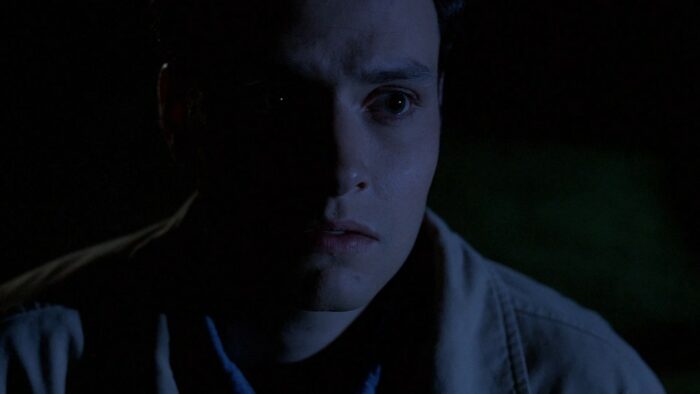
“Then there are those who care not about extraterrestrials, searching for meaning in other human beings. Rare or lucky are those who find it. For although we may not be alone in the universe, in our own separate ways on this planet, we are all…alone.”
—Jose Chung, ‘Jose Chung’s From Outer Space’
‘Jose Chung’s From Outer Space’ is similar to other Season 3 classics like ‘Pusher’ and ‘Wetwired’; in these cases the victims become isolated from everyone around them, because no one else seems to be experiencing the same reality as them. The plot of ‘Jose Chung’ necessitates loneliness, because each character has their own version of events that they struggle to make the others believe; the audience might be reminded of the way that Mulder continually fails to make Scully see the world from his perspective. In this context, Chung’s pessimistic words seem reasonable. Although Mulder and Scully might search “for meaning in other human beings” he proposes they will most likely fail.
“…though we’ve travelled far together, this last distance must necessarily be travelled alone.”
—Agent Scully, ‘Memento Mori’
That phrase—”searching for meaning in other human beings”—leads me to think of the MSR, but also of a major overarching theme in The X-Files, which is about searching for people who are lost, and about how the dead continue to affect the living. In other words, grief. Like the events of ‘Jose Chung’, grief is often a shared experience that is simultaneously incredibly isolating. During the “cancer arc” of Season 4, Mulder and Scully experience anticipatory grief. In the opening monologue of ‘Memento Mori’ we see Scully standing alone, and though most of her words are about Mulder and her gratitude for their partnership, it conveys the overwhelming loneliness of knowing she is going to die. To go a step further, death itself might be the ultimate loneliness. How can you share death? From Mulder’s perspective, when he cries at Scully’s bedside in ‘Redux II’ she is asleep and doesn’t know he is there. This is another example of an internal experience that, short of a psychic connection, cannot be experienced collaboratively. These things considered, it would be easy to believe that we really are all alone.
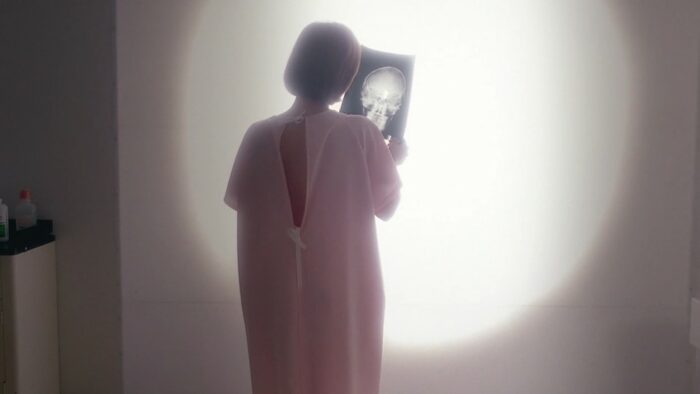
“What can be imagined can be achieved… that you must dare to dream, but that there’s no substitute for perseverance and hard work, and teamwork, because no one gets there alone.”
—Agent Scully, ‘Max’
In The X-Files, the fact that we are not alone in the universe seems to have exclusively been a problem for humanity. However in Scully’s speech at the end of ‘Max’, she vouches for the value of collaboration, and the way that people can bring out the best in each other. This is a far more optimistic take than the one Jose Chung had. It is appealing because it might make us hopeful for our own lives, but also because it reflects positively on our heroes that their mission is not hopeless.
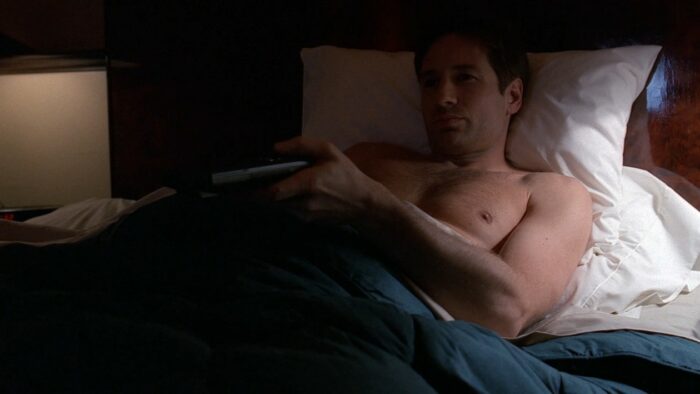
These two scenes present to the audience contrasting versions of Agent Mulder. Alone in bed, watching a Big Foot tape with…enthusiasm, the Mulder in ‘Jose Chung’s From Outer Space’ is a loser and borderline pervert. In Chung’s voiceover he is described as a “ticking time bomb of insanity”; I would contest Chung’s use of the word “insanity”, however he has not entirely missed the mark by insinuating that Mulder’s obsession with the truth would endanger his psychological well-being. At the beginning of Season 10 we learn that Mulder’s depression has isolated him from Scully. In ‘Amor Fati’ severe trauma on his brain literally forces him to live in a world inside his own head. Jose Chung has correctly observed that Mulder’s “quest into the unknown” is a miserable one. It can be lonely, because the thing he seeks (whether he knows it or not) is not an objective external reality that he can share with Scully, but his personal satisfaction and peace. When he goes to meet Samantha’s spirit at the end of ‘Closure’, thus achieving this goal, he goes alone. Given that ‘Jose Chung’ is a self-satirising comedy this overly negative version of Mulder is fitting.
Conversely, ‘Tempus Fugit’/’Max’ suggests that Mulder has an innate capacity for love and friendship. The two-parter introduces us to a Mulder who is trying his best to make his friend happy on her birthday. Their smiles should be a testament to Chung’s short-sightedness. And while ‘Jose Chung’ ends with Harold Lamb walking off alone, ‘Max’ ends with Mulder and Scully walking away together. On the other hand, it is important to note that the speech in ‘Max’ comes from Scully’s perspective. In the ‘Tempus Fugit’/’Max’ two-parter, Mulder is alone in his theories, surrounded by non-believers, and alone in his grief for Max. I would suggest that Mulder’s loneliness doesn’t come from something embedded in his psyche, as Chung implies, but from the people around him and their inability or refusal to understand him.
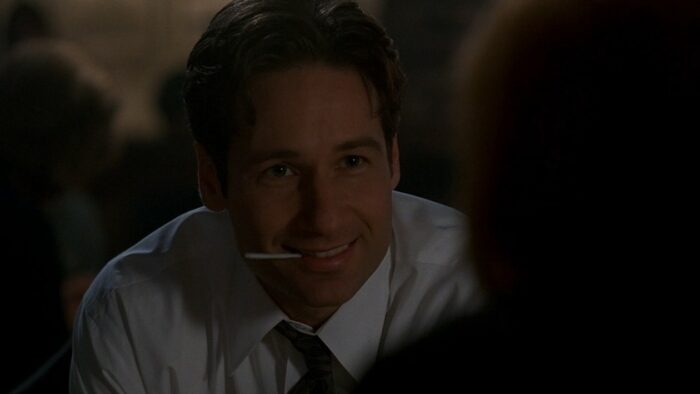
When Scully says “no one gets there alone” what is the “there” she is referring to? The moon? The Platonic ideal of Justice? The Screen Actor’s Guild Awards? Gillian Anderson included part of this monologue in her acceptance speech when she won the Screen Actor’s Guild award for Best Female Actor in a Television Drama Series (“this is something that our creator, Chris Carter, has written, in something that I’m supposed to perform tomorrow and obviously I’m not prepared”). She goes on to thank, among others, David Duchovny, and the X-Files crew. Like Scully, she is acknowledging herself as part of a team.
“But you saved me! As difficult and as frustrating as it’s been sometimes, your goddamned strict rationalism and science have saved me a thousand times over! You’ve kept me honest … you’ve made me a whole person.”
—Agent Mulder, Fight the Future
Mulder and Scully are the ultimate team, each other’s perfect collaborator. In a practical sense, Mulder needs Scully’s scientific knowledge to solve cases, and Scully needs Mulder to keep her mind open. But arguably the point of this “perfect” collaboration is that it goes beyond their practical need for each other; the famous hallway scene of Fight the Future touches on this very thing. Scully has been pushed to the point that she wants to leave the X-Files, and is suggesting that Mulder could and should go on without her. “You don’t need me,” she says “[…] I’ve just held you back”. When Mulder contests this, telling Scully that she has “made (him) a whole person”, I don’t think this is about practicality. It is read by fans as a confession of love. I believe that the “there” that Scully means to get to isn’t outer space but something more personal.
The surrounding context of Harold Lamb and Chrissy Giorgio implies that Chung’s words are about unrequited love. This matches the pervert/loner Mulder and the work-oriented Scully that Chung depicts. At this point in the canon, the MSR is barely burgeoning, and far from consummated. Nonetheless, Mulder and Scully’s relationship in all its forms—their platonic collaboration, if you will—is the strongest argument for why Chung is wrong. Still, I don’t think that “there” is love, not exactly.
The keychain makes a return in Season 8’s aptly named ‘Alone’—Scully re-gifts it to Doggett, symbolising how his partnership has been necessary both professionally and emotionally: “after this past year and everything that we’ve been through […] I wouldn’t be here without you”. I think that “there” is just “tomorrow”, and it’s not just that “no one gets there alone” but no one has to get there alone. We need only look at the journey of this keychain to see why we might disagree with Chung. Maybe in a solipsistic sense we are alone, but that doesn’t mean that love and friendship don’t exist. And even though it might be fruitless, we still strive to make connections with other people, because we couldn’t get through life without them.
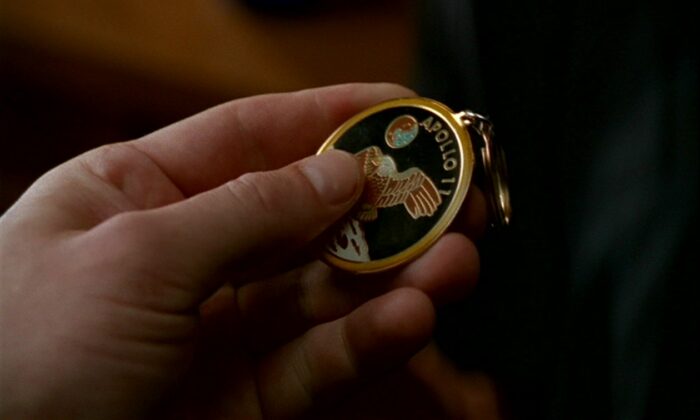
It is not unusual for The X-Files to reconcile opposing viewpoints. The famous slogans “trust no one” and “I want to believe” appear conflicting. Mulder and Scully themselves are “reason and faith in harmony”. The show can make us believe that both the scientific and supernatural explanations are true. However, it was wrong of me to present these two speeches as containing mutually exclusive arguments. It’s true to an extent that everyone lives inside their own internal worlds, processing emotions like grief, and memories of inexplicable alien encounters, alone—this is an idea that The X-Files returns to frequently. It’s also true that people like Mulder and Harold Lamb remain misunderstood by those around them. But I don’t think this means that collaboration is hopeless. How can it be? The X-Files would fall apart if it was. It is precisely because life on Earth is so lonely that collaboration is so valuable.

